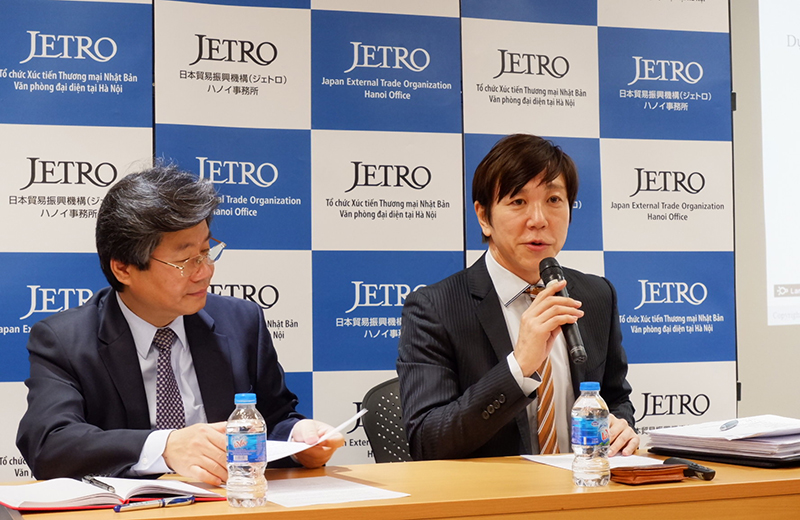Japanese firms refrain from investing in Vietnam on global slowdown: Survey
Despite a decline, the rate for Vietnam is the highest in Southeast Asia and the third highest in Asia and Oceania, according to the JETRO survey.
Nearly two thirds (63.9%) of Japanese companies have plans to expand operations in Vietnam in the next one to two years, a survey of the Japan External Trade Organization (JETRO) has shown, down 5.9 percentage points from the previous survey.
Despite a decline, the rate for Vietnam is the highest in Southeast Asia and the third highest in Asia and Oceania, the JETRO Hanoi Office said at a press meeting on Friday.
| Source: 2019 JETRO survey on business conditions of Japanese companies in Asia and Oceania |
Some 75% of companies established between 2016 and 2019 expressed their intention to expand operations while the rate is inversely proportional to the age of the companies.
One third (33.3%) of the respondents said they have no expansion plan in the short term while 2.7% planned to scale back operations, up 1.8 percentage points from last year’s survey.
| Source: 2019 JETRO survey on business conditions of Japanese companies in Asia and Oceania |
Explaining the changes at the request of Hanoitimes, Takeo NAKAJIMA, chief representative of the JETRO Hanoi Office, said a global and regional economic slowdown in 2019 discouraged Japanese companies to expand investment in Vietnam. Some Japanese manufacturers in Vietnam rolled back operations because their export markets narrowed.
In addition, an increase in value added tax (VAT) by the Japanese government has resulted in lower purchasing demand in the country and in turned hurt exports of some Japanese companies operating in Vietnam, NAKAJIMA added.
| Takeo NAKAJIMA (R), chief representative of the JETRO Hanoi Office, speaks at the press meeting. Photo: Minh Tuan/Hanoitimes |
Reasons for future business expansion
The survey points out a spate of top factors behind Japanese businesses’ intention to increase investment in Vietnam. They are sales increase in local markets, sales increase due to export expansion, high growth potential, relationship with clients, and high receptivity for high value-added products.
However, at the bottom of their choice were deregulations, ease in securing labor force and reduction of costs.
| Source: 2019 JETRO survey on business conditions of Japanese companies in Asia and Oceania |
Respondents also said Vietnam’s investment environment has many advantages for Japanese businesses, such as size and growth of markets, political and social stability, and ideal living environment for foreigners. These indicators have received more positive feedback from Japanese businesspeople.
Risks persist
The chief representative of JETRO Hanoi also pointed out a number of risks for Japanese enterprises in Vietnam, including rising labor costs, complicated administrative procedures and tax regulations, high rate of employees quitting job, and imperfect legal framework and non-transparent enforcement.
In comparison with regional peers, Vietnam ranks low in terms of non-transparent policy enforcement by local government, and low development of infrastructure. Meanwhile, Japanese businesses are highly concerned about high rate of employees quitting job, and undeveloped supporting industries.
In addition, Japanese companies are worried about other risks such as unilateral withdrawal of incentives; cumbersome procedures for permit in a wide range of fields such as investment, customs, tax inspection, fire prevention, among others; power shortage; and sluggish infrastructure projects.
To better the investment climate, Japanese enterprises proposed the Vietnamese government remove existing difficulties and obstacles that increase their business costs.
Of a total of 13,458 surveys sent out, JETRO valid responses from 5,697 Japanese companies (42.3%) operating in Asia and Oceania. As many as 858 companies in Vietnam responded, out of 1,608 surveys sent out, representing the highest rate in the region.
















